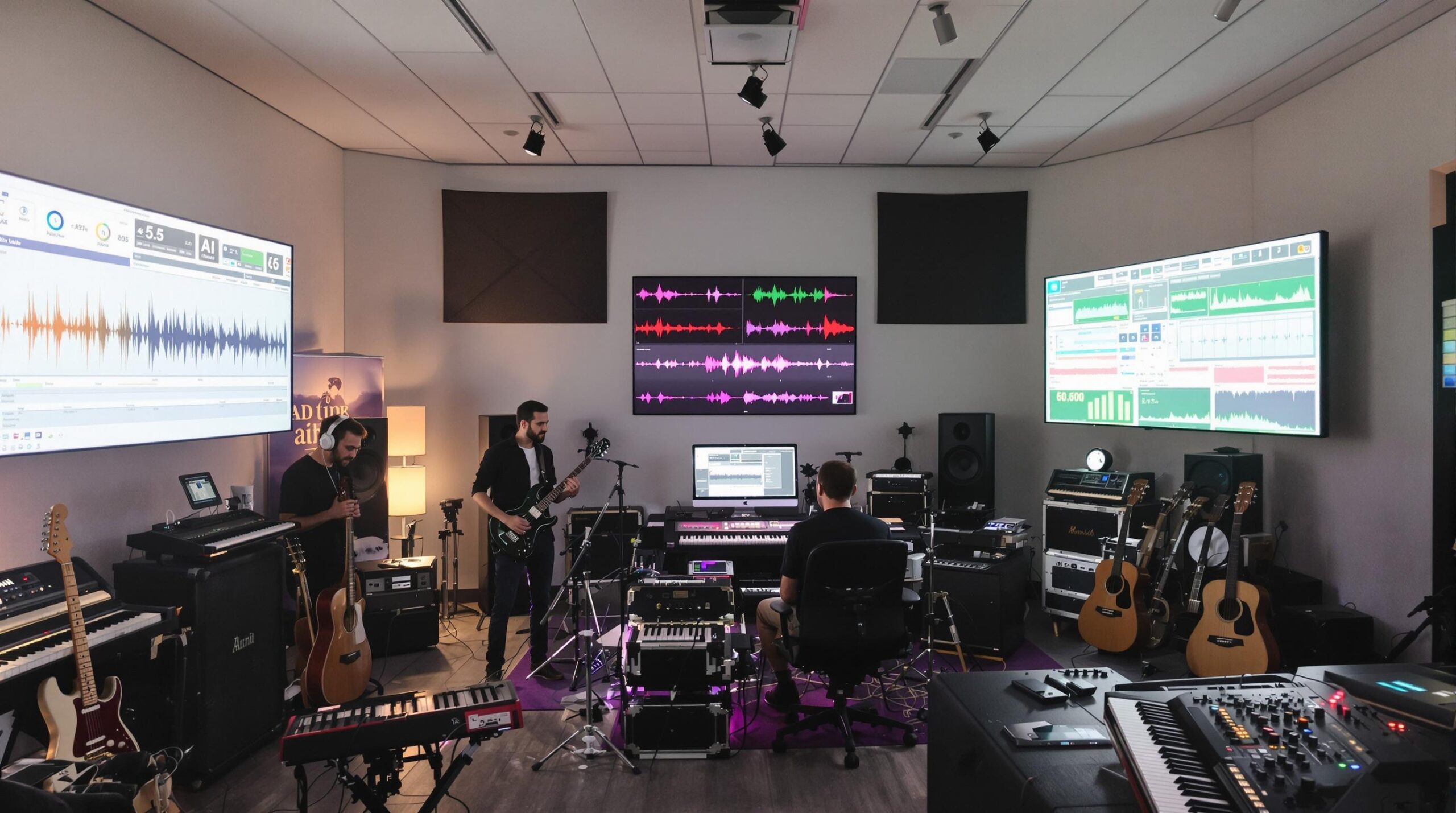Artificial Intelligence (AI) has permeated various facets of human life, and music production is no exception. From composing melodies to mastering tracks, AI-driven innovations are revolutionizing how music is created, produced, and consumed. This article explores AI’s transformative impact on the music production landscape, examining both advantages and challenges. It also considers the implications for musicians, producers, and the broader music industry.
AI in Music Composition
AI algorithms can now compose music, providing artists with creative assistance. Software like OpenAI’s MuseNet can generate music in numerous styles and genres. It can blend genres seamlessly, thus enabling composers to explore new musical territories. These tools assist musicians in overcoming creative blocks by suggesting novel chord progressions and melodies. This collaboration between humans and machines is unlocking new innovative potential.
Generating Melodies and Harmonies
AI systems analyze vast datasets of musical compositions to learn patterns and structures. Based on these patterns, they can generate original melodies and harmonies. For instance, Google’s Magenta project uses machine learning to create music and artistic content. By leveraging these technologies, musicians can experiment with unique musical ideas, pushing the boundaries of creativity.
Advantages for Songwriters
Songwriters benefit from AI-driven composition tools by constantly receiving fresh inspiration. These tools suggest lyrics, melodies, and harmonies, which can be customized to fit an artist’s style. The speed at which AI can generate options significantly enhances the songwriting process. Consequently, musicians can focus more on refining their artistic vision and less on initial ideation.
AI in Sound Engineering
Sound engineering is another area where AI significantly impacts music production. AI tools assist in tasks such as mixing and mastering tracks, efficiently delivering exceptional audio quality.
Automating, Mixing and Mastering
AI-powered platforms like LANDR and iZotope’s Neutron automate the mixing and mastering. These platforms analyze audio tracks and apply various enhancements automatically. Musicians and producers benefit from high-quality outputs without extensive technical expertise. This democratization of sound engineering makes professional production accessible to emerging artists.
Enhancing Audio Quality
AI-driven technologies improve audio quality by identifying and correcting imperfections. Algorithms detect distortion, noise, and frequency imbalances and make necessary adjustments. This results in cleaner, more polished final tracks. By streamlining this process, AI enables producers to spend more time on creativity and innovation.
Collaboration in the Digital Realm
AI fosters new opportunities for collaboration in music production. Musicians and producers worldwide can collaborate more effectively using AI as a bridge.
Bridging Time Zones and Cultures
AI tools facilitate collaboration between artists across different time zones and cultural backgrounds. Platforms like BandLab allow musicians to share and work on projects remotely. AI assists in synchronizing and harmonizing contributions, ensuring cohesive results. By transcending geographical barriers, music production becomes a truly global endeavor.
Aiding In Remote Collaborations
Virtual collaboration has become increasingly important, especially during global disruptions like the COVID-19 pandemic. AI tools offer features like real-time editing and feedback, enhancing collaborative workflows. Musicians can upload riffs, lyrics, or beats; others can contribute seamlessly. This improves productivity and creativity, enriching the cooperative experience.
Challenges of AI Integration
While AI offers immense benefits, it also presents challenges that need addressing. The music industry must navigate ethical, creative, and technical issues from AI integration.
Concerns about Creativity and Authenticity
Critics argue that AI-generated music lacks human-created compositions’ emotional depth and authenticity. This raises questions about the artistic value of machine-composed music. Musicians need to find the right balance between AI-generated insights and human creativity. Incorporating personal emotions and experiences ensures that music remains a genuine expression of artistry.
Ownership and Copyright Issues
Intellectual property concerns arise with AI-created music, particularly about ownership and copyright. Determining who holds the rights to AI-generated compositions is complex. Legal frameworks worldwide must evolve to address these issues and protect artists’ rights. Ensuring fair compensation and recognition for creators remains a critical consideration.
The Road Ahead: AI’s Impact on the Industry
AI’s influence on music production is set to grow, ushering in new possibilities and challenges. The industry must adapt to remain competitive and relevant.
Transforming Music Education
AI-powered tools can revolutionize music education by providing personalized learning experiences. Platforms like Yousician use AI to tailor lessons to individual learners, enhancing musical proficiency. Adaptive learning algorithms adjust content based on progress and skill level. This personalized approach can democratize music education, making it more accessible and engaging.
Influencing Future Music Trends
AI impacts future music trends by enabling unprecedented experimentation and innovation. Artists explore unique sounds, fusing genres and styles like never before. AI tools provide data-driven insights into consumer preferences, helping artists target their audience effectively. This information can guide creative decisions, shaping the future of music.
Balancing Innovation and Tradition
Embracing AI in music production requires balancing innovation and tradition. While AI offers new potential, traditional skills and artistry remain invaluable. Musicians and producers must leverage AI tools to enhance, not replace, human creativity. Navigating this balance ensures that music retains its essence and authenticity.
Conclusion
AI-driven innovations are transforming the music production landscape, ushering in a new era of creativity and collaboration. From composing melodies to engineering sound, AI enhances every aspect of the production process. While challenges persist, such as questions of authenticity and ownership, the benefits are undeniable. Musicians and producers who embrace AI tools can unlock new avenues for artistic expression. AI’s role will undoubtedly expand as the industry adapts to this evolving landscape, shaping music’s future. With a careful balance of innovation and tradition, AI can enhance music’s cultural and personal significance, celebrating human creativity in an increasingly digital world.

